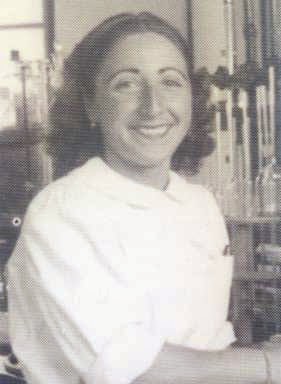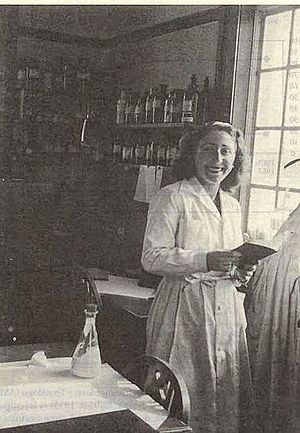Sara Borrell Ruiz facts for kids
Quick facts for kids
Sara Borrell Ruiz
|
|
|---|---|
 |
|
| Born | 1917 |
| Died | 1999 |
| Nationality | Spanish |
| Alma mater | University of Madrid |
| Known for | Pioneering work on analysis and metabolism of steroid hormones |
Sara Borrell Ruiz (born in Madrid, Spain, in 1917 – died in Madrid, Spain, in 1999) was an important Spanish scientist. She was a pharmacist and a biochemist. She is famous for her early work on how to study and understand steroid hormones in the body.
Contents
Her Early Life and Education
Sara Borrell Ruiz grew up in Madrid, the capital of Spain. Her family believed that women should have the chance to go to college and get a good education.
Her Family
Sara's mother, Sara Ruiz Albéniz, was a teacher and an artist. She was also the niece of a famous Spanish music composer named Isaac Albéniz. Her mother even helped the painter Cecilio Plá as an assistant.
Sara's father, José Borrell, was a pharmacist. His family owned a pharmacy in the middle of Madrid. He was also part of a political group called "Izquierda Republicana" (Republican Left). Because of his political views, he was put in prison during the first years of Franco's dictatorship in Spain. This family background helped shape Sara's choices in education and science.
Studying at University
Sara first wanted to study to become an agricultural engineer, just like her brother. However, she was not allowed to join the program because she was a girl.
So, in 1933, she decided to study pharmacy instead. She went to the University of Madrid, which is now known as the Complutense University of Madrid. Her studies were stopped for a few years because of the Spanish Civil War (1936-1939). But she finished her degree in 1940. In 1944, she earned her PhD. Her special research for her PhD was about the water from the Tagus River.
Her Scientific Career
Sara Borrell Ruiz started her career in 1935. She worked in a lab at the University of Madrid that focused on analytical chemistry. Here, she learned important ways to measure and analyze different substances.
Early Research and Travel
After the war, it was a difficult time in Spain. Sara became very interested in how food affects health and how to keep things clean. From 1941 to 1949, she taught as an assistant professor of Bromatology (the study of food) at the University of Madrid.
In 1946, she traveled to Scotland to do more research after her doctorate. She worked at the Hanna Dairy Research Institute in Ayr. There, she learned how to study and work with milk proteins. This became a special area of her research.
Working with Hormones
In 1949, Sara became a permanent researcher at the Spanish National Research Council (CSIC). The next year, a famous scientist named Gregorio Marañón asked her to join a new institute. This institute, at the CSIC, studied hormones. Sara was asked to work on the chemistry of hormones.
To learn even more, she went to Cambridge, England, in 1950. She worked at the Dunn Nutritional Laboratory and later at the Courtauld Institute for Chemistry in London. In 1953, she went to the United States. There, she worked with Gregory Pincus at the Worcester Foundation for Experimental Biology in Massachusetts. They studied the chemistry of steroid hormones.
Leading Research in Spain
When Sara returned to Spain, she became the head of the Steroids Division. This division was part of the "Gregorio Marañón Institute," named after the Spanish doctor and scientist.
In 1963, she helped start the Spanish Society for Biochemistry. This group brings together scientists who study the chemistry of living things. In 1983, she moved to a new place called the Cajal Institute (CSIC). She worked there until she retired in 1989.
Her Lasting Impact
Sara Borrell Ruiz's research was very important. Her findings were published in well-known science magazines like Hormone Research Journal of Endocrinology, Biochemical Journal, and Nature.
She also taught and guided many young scientists. Because of her important work, the Carlos III Health Institute created a special program. It's called the Sara Borrell Grant program. This program helps young scientists get more training after they finish their main studies. It is still helping researchers today.
See also
 In Spanish: Sara Borrell Ruiz para niños
In Spanish: Sara Borrell Ruiz para niños
 | Aaron Henry |
 | T. R. M. Howard |
 | Jesse Jackson |


